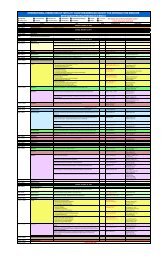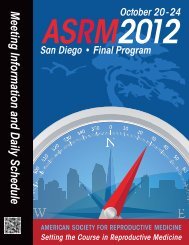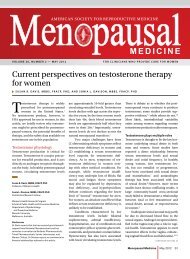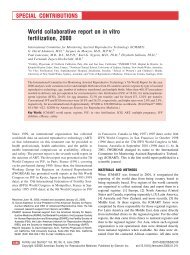scientific program • symposia - American Society for Reproductive ...
scientific program • symposia - American Society for Reproductive ...
scientific program • symposia - American Society for Reproductive ...
Create successful ePaper yourself
Turn your PDF publications into a flip-book with our unique Google optimized e-Paper software.
SCIENTIFIC PROGRAM <strong>•</strong> INTERACTIVE SESSIONS<br />
Tuesday, October 18, 2011 1:15 pm – 2:15 pm<br />
Interactive Session<br />
TO ICSI OR NOT TO ICSI ALL? THAT IS THE QUESTION.<br />
AN INTERACTIVE DEBATE.<br />
Presented by the <strong>Society</strong> of <strong>Reproductive</strong> Biologists and Technologists<br />
Kathryn J. Go, Ph.D. (Chair)<br />
The <strong>Reproductive</strong> Science Center of New England<br />
J. Michael Wilson, Ph.D.<br />
E.L.C. LLC<br />
Douglas T. Carrell, Ph.D.<br />
University of Utah School of Medicine<br />
Needs Assessment and Description<br />
Intracytoplasmic sperm injection (ICSI) represents the most<br />
aggressive method <strong>for</strong> achieving fertilization and a way<br />
of avoiding idiopathic fertilization failure. Recent SART/<br />
CDC reports (2006-2008) reflect that ICSI has been applied<br />
in over 60% of ART treatment cycles in which both male<br />
factor and non-male factor existed. This high utilization<br />
merits the consideration that ICSI could be proposed as the<br />
routine, global method <strong>for</strong> fertilization in vitro, supplanting<br />
conventional insemination entirely, but the added<br />
manipulation and risk may be barriers to this paradigm. A<br />
debate on the advantages of each of these approaches,<br />
specifically the universal versus selective use of ICSI, offers<br />
the opportunity to gain an in<strong>for</strong>med perspective <strong>for</strong> clinical<br />
practice.<br />
Room 224 G/H<br />
90<br />
Learning Objectives<br />
At the conclusion of this session, participants should be able<br />
to:<br />
1. Identify and contrast the reasons and objectives <strong>for</strong> ICSIall-eggs<br />
versus using ICSI only when specific clinical<br />
factors warrant its inclusion in the IVF treatment, e.g., male<br />
factor, history of failed fertilization (selective ICSI).<br />
2. Appraise the merits and disadvantages of an ICSI-all-eggs<br />
vs. selective ICSI policy.<br />
3. Support the selection of ICSI-all vs. selective-ICSI <strong>for</strong> one’s<br />
practice.<br />
ACGME COMPETENCY<br />
Medical Knowledge<br />
Patient Care<br />
Tuesday, October 18, 2011 1:15 pm – 2:15 pm<br />
Interactive Session<br />
SRS DEBATE: ENDOMETRIOMAS: TREATMENT OR NO TREATMENT<br />
FOR FERTILITY<br />
Presented by the <strong>Society</strong> of <strong>Reproductive</strong> Surgeons<br />
Steven F. Palter, B.A., M.D. (Chair)<br />
Gold Coast IVF, New York<br />
Juan A. Garcia Velasco, M.D.<br />
IVI Madrid<br />
Antonio R. Gargiulo, M.D.<br />
Brigham and Women’s Hospital<br />
Needs Assessment and Description<br />
Endometriosis is a major cause of infertility, yet one that<br />
is potentially treatable with multiple different therapies<br />
including medications, surgery, and ART. Considerable<br />
controversy exists regarding the optimal management of<br />
those patients with infertility found to have endometriomas.<br />
The literature contains conflicting recommendations<br />
regarding the optimal use and risks of surgery and ART in<br />
this population. This session will compare and contrast<br />
the reasons <strong>for</strong> treating or not treating endometriomas in<br />
patients desiring fertility.<br />
Room 224 E/F<br />
TEST QUESTION:<br />
After participating in this session, in my practice I will advise<br />
patients that:<br />
A. There is no difference between ICSI and conventional<br />
insemination.<br />
B. ICSI is an unproven methodology without clinical merit.<br />
C. ICSI improves in vitro maturation as well as fertilization<br />
rates.<br />
D. There are rationales <strong>for</strong> both using ICSI globally and using<br />
it selectively.<br />
E. All IVF centers have the same views and perspectives on<br />
using ICSI.<br />
F. Not applicable to my area of practice.<br />
Learning Objectives<br />
At the conclusion of this session, participants should be able<br />
to:<br />
1. Identify the potential benefits and risks of treating<br />
endometriomas in patients seeking fertility treatment.<br />
2. Select the best treatment <strong>for</strong> endometriomas in patients<br />
with infertility.<br />
ACGME COMPETENCY<br />
Medical Knowledge<br />
Patient Care<br />
TEST QUESTION:<br />
After participating in this session, <strong>for</strong> a 38-year-old patient<br />
with a 5 cm endometrioma who plans IVF, in my practice I<br />
will recommend the following:<br />
A. Incision and fulguration of the cyst wall is optimal surgical<br />
therapy.<br />
B. Surgery should not be attempted be<strong>for</strong>e IVF is completed.<br />
C. Stripping of the cyst wall is the optimal approach if<br />
surgery is chosen.<br />
D. Pregnancy rates are significantly improved if the patient<br />
has had 2 previous failed IVF cycles despite the transfer<br />
of high grade blastocysts.








